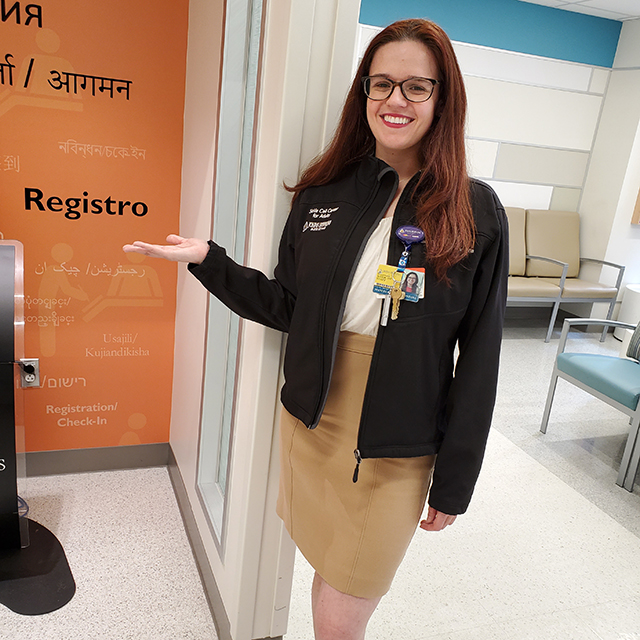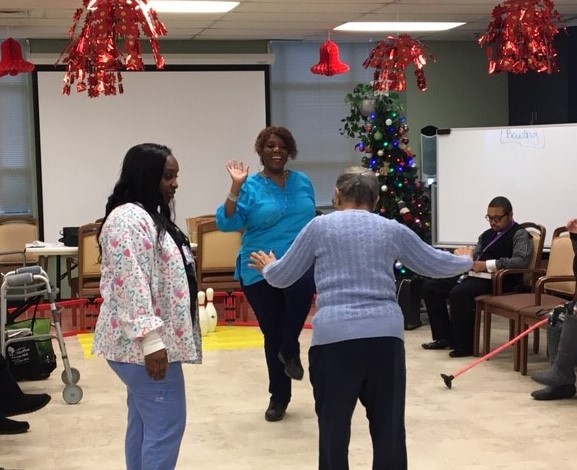While working as an area cleaner at The Johns Hopkins Hospital, Shanee Carrington decided she was ready for new challenges. The problem, she says, was how to take the next professional step.
“I was having a hard time seeing how to move up the ladder,” Carrington says.
When one of her environmental care managers recommended she apply for a supervisor apprenticeship, Carrington jumped at the chance.
The registered apprenticeship program at The Johns Hopkins Hospital and Johns Hopkins Bayview Medical Center is sponsored by the Baltimore Alliance for Careers in Healthcare (BACH). A nonprofit organization founded by Baltimore City officials, the Johns Hopkins human resources department and area nonprofits, the organization offers people looking for health care careers a chance to become leaders.
In 2016, BACH received a grant from Maryland’s Department of Labor to launch a health care apprenticeship program targeting current workers and unemployed refugees or immigrants to address the critical shortage of skilled workers in the health care industry. BACH’s apprenticeship programs are “earn as you learn” and competency-based models, providing participants the opportunity to train on the job as paid full-time employees while completing coursework.
Carrington graduated from the yearlong program in June 2018. She, like all apprentices, participated in full-day Saturday seminars through the Community College of Baltimore County for 14 weeks while working full-time at The Johns Hopkins Hospital.
Carrington says she’s learned that leadership is more than just delegating tasks.
“Sometimes you have to wear multiple hats,” she says. “You’re a counselor, an older sister and a mother. It’s taught me about compassion and empathy and how to deal with multiple people from different backgrounds. You have to take the time out to get to know the staff and learn how you can help them succeed.”
BACH career coach Namika Mahmoodi says the organization acts as an intermediary for qualified candidates and employers.
“We have connections to the employer, to the participants and to the academic institution,” she says. “We focus on the individual’s career growth and advocate for them.”
After successful completion of the training, Environmental Care apprentices receive a JourneyWorker Apprenticeship certificate from the state of Maryland and a Community College of Baltimore County continuing education certificate. They also are guaranteed a supervisor position at The Johns Hopkins Hospital or Johns Hopkins Bayview Medical Center.
According to Kiera McCarthy, BACH’s apprenticeship program manager, 22 people have successfully completed the program to date. Approximately 50% of participants were recruited internally, and 50% are refugees or immigrants. Of BACH’s apprenticeship participants, 88% are minorities, and they represent 13 countries of origin.
McCarthy says apprentice programs have a 94% retention rate nationally.
“When you invest a lot of training and resources in an employee, you want to see that employee succeed,” she says. “Our apprentices are confident in their roles because they are well trained. After completing the apprenticeship, supervisors earn up to $7 more an hour.”
Garin Richardson, director of environmental care at the Johns Hopkins Health System, says all apprentices work side by side with an experienced supervisor from the start of the program. They learn how to coach associates on best cleaning practices, oversee staffing, and divide assignments to make sure all areas of the hospital are clean. They also coordinate with charge nurses to prioritize rooms while monitoring the quality of cleaning.
Richardson says it is critically important for the environmental care staff to ensure that hospital rooms are clean and disinfected. Each day, his team is responsible for disinfecting the entire hospital, including rooms for patients with COVID-19 and other isolation rooms, while knowing the risks to their health. The team is an important part of the front-line patient care team and is vital to the hospital’s mission.
“It’s a big responsibility,” Richardson says. “The staff help save lives by preventing diseases from spreading from environmental surfaces inside patient rooms to other patients, staff and the public.”
Richardson says the environmental care staff uses mobile phones to scan QR codes when they start to clean and when they finish. Supervisors can see when an area is marked as completed, then they inspect it methodically and complete a checklist. They also use an invisible fluorescent gel and black lights to ensure all areas are clean.
While language barriers can sometimes be an issue at first, Richardson says good communication is key.
“Supervisors need to develop trusting relationships with their staff,” he says. “They have to learn how to help them achieve the quality of work we expect them to do. They also need to celebrate the things the staff does right.”
Environmental care supervisor Helen Tekleweini graduated from the program in March 2020. She had moved to the United States from Eritrea, where she obtained an accounting certificate.
“I loved it,” she says of the apprenticeship program. “You learn and you’re on the job at the same time. It’s a great opportunity.”
Tekleweini says she learned about cleaning while also preparing to be a good leader.
“To be a leader, you have to be a patient and active listener,” she says. “I learned how to give everyone time to talk and express their feelings.”
Maureen Apugo completed the apprentice program in November 2019. She moved to the United States from Nigeria — she says she was searching for a better career opportunity.
“It was all very informative,” Apugo says about the program. “We had computer literacy classes and learned how to work with people. I learned how to be patient and just listen to my associates.”
Anthony Ford graduated from the apprentice program in June 2018. He started as a floor technician at The Johns Hopkins Hospital before joining the program.
“It made me a better leader because I learned that I didn’t have to take issues on by myself,” Ford says. “I learned to count on my co-workers to help get areas cleaned. We’re a team.”
Environmental care supervisor Ripandeep Kaur completed her apprenticeship in May 2019. Before she moved to the United States, Kaur was a teacher in India.
“When you take good care of things, you see that you did something good that day,” Kaur says. “This work gives you a kind of satisfaction.”


